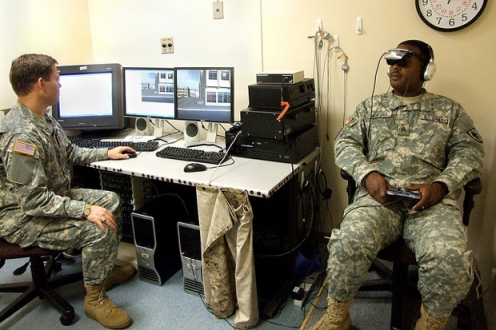Beyond gaming: virtual reality in healthcare
27 Mar, 14 | by BMJ
Following the high profile purchase of Whatsapp, Facebook has made yet another acquisition. The company behind the Oculus Rift virtual reality headset, which found success on Kickstarter (and has since been the darling of the indie tech scene) was bought for $2bn this week.
Although gaming is a cornerstone of Facebook’s business, Mark Zuckerburg’s statement shows that he has further reaching ambitions for virtual reality (VR):
“Imagine enjoying a court side seat at a game, studying in a classroom of students and teachers all over the world or consulting with a doctor face-to-face — just by putting on goggles in your home.…This is really a new communication platform.”
In fact, healthcare is already a big adopter of virtual reality, with applications already in surgery simulation, phobia treatment, robotic surgery and skills training.

At the Games for Health Conference last year, Palmer Luckey (founder of Oculus VR) explained that the greatest advantage of VR is that it makes you feel present in a space. This enables users to experience a variety of sensations, such as sense of scale, sensations of falling, and more. In fact, research has shown that VR makes it easier to evoke emotions in users as well.
It is this ability to evoke strong emotion that has made the Oculus Rift part of Skip Rizzo’s virtual reality therapy (VRT) research. A clinical psychologist at the University of Southern California’s Institute for Creative Technologies (which Luckey was once a member of), Rizzo works to implement VR into a variety of clinical psychology applications – most notably enhancing what is known as exposure therapy to treat soldiers with PTSD.
Rizzo and his group created a virtual simulation (Virtual Iraq) using the Xbox game Full Spectrum Warrior. The objective is to completely immerse patients in a computer-generated world where they can undergo therapy and training in a safe, artificial environment controlled by a clinician. By pacing the exposure in a much more controlled fashion and in a way that engages the user, clinicians can control the progression of therapy. Studies have shown that VRT is effective in significantly reducing PTSD symptoms and more research is underway to compare its effectiveness with traditional approaches.
Annette Mossel, a lecturer at the Interactive Media Systems (IMS) Group at Vienna University of Technology, first discovered the Oculus Rift after Luckey invited her to test an early prototype. In 2012, her research group published a paper, which explains how this technology can be used to train and rehabilitate amputee patients receiving prosthesis. They developed a motion capture system that tracks an amputee’s arm and head movement in three dimensions within a virtual environment. “By combining this tracking data with electromyography to generate input for grasping controls for a virtual prosthesis, researchers can create a realistic training simulating for familiarising patients with their prosthesis.”
Although it’s generally accepted that virtual reality will not replace the expert human component, it does open up a host of opportunities in the medical field. The acquisition of Oculus VR by Facebook enforces the broadening appeal of virtual reality beyond the stereotypical videogaming context, so expect to see more industries actively engaging with this technology in the coming months.